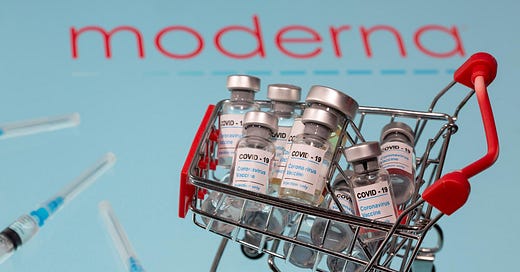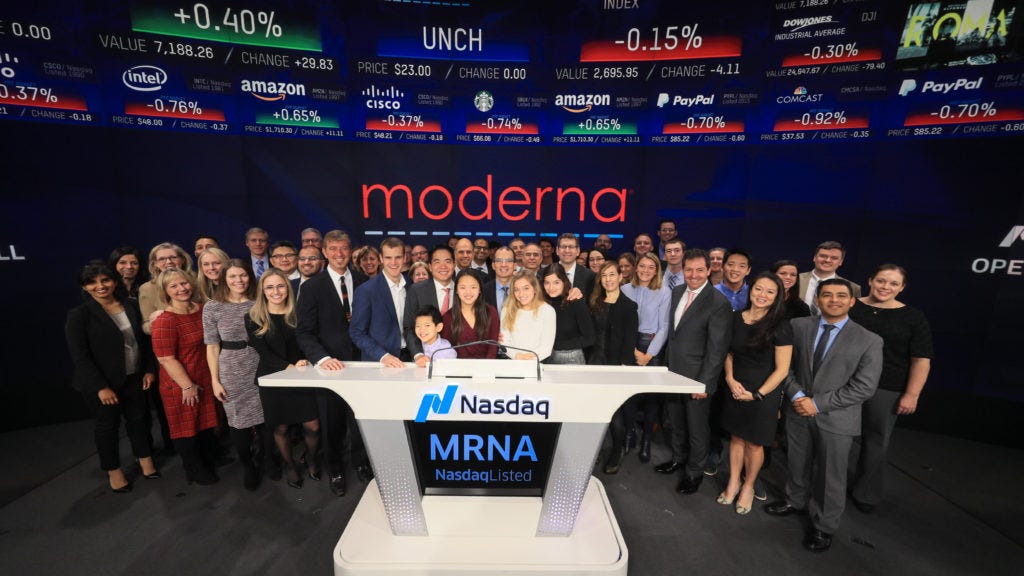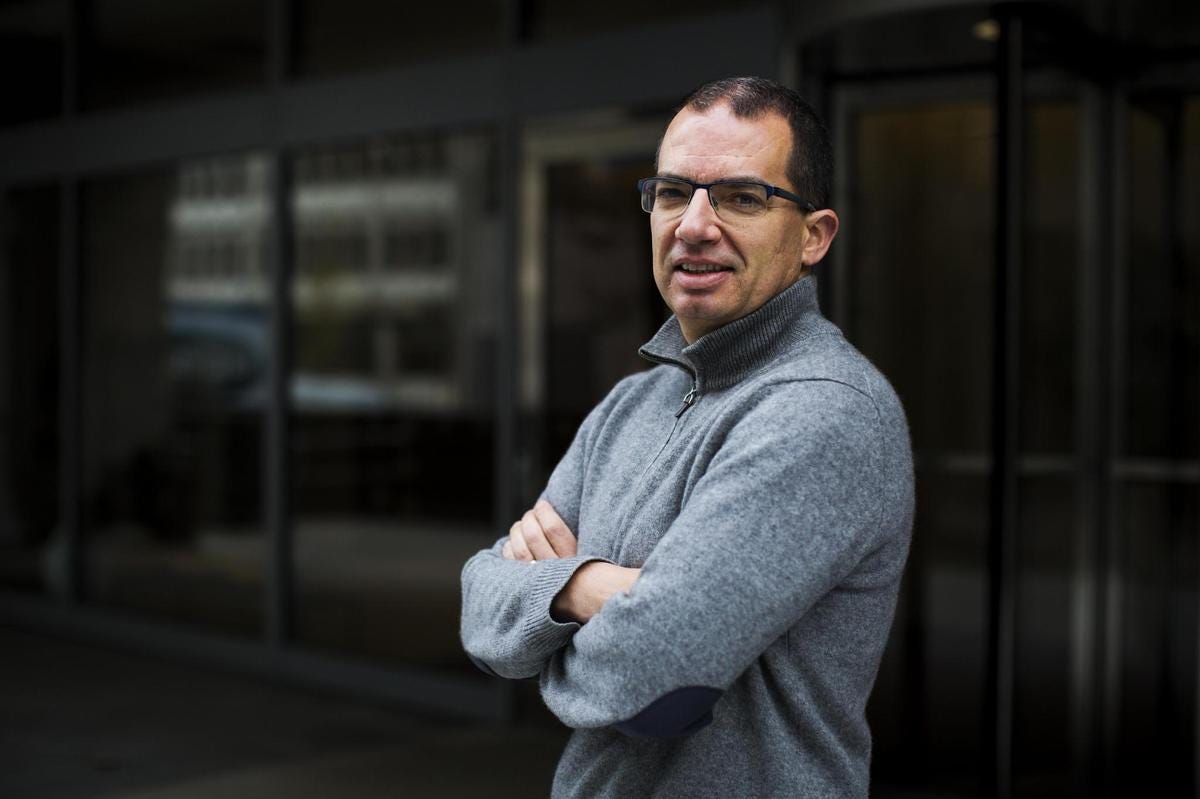Moderna: Skyrocketing achievements and profits!
Ten interesting facts about Moderna, its Covid-19 vaccine, and mRNA medicines
Moderna, Inc. (NasdaqGS: MRNA) is a biotechnology company. It develops therapeutic medicines and vaccines, based on messenger RNA, or mRNA, for the treatment of infectious diseases, cancer, rare diseases, cardiovascular diseases, and auto-immune diseases.
Moderna produced a working and administrable version of a Covid-19 vaccine within only 25 days of receiving the coronavirus’ DNA sequence. Alongside Pfizer-BioNTech, it beat much larger players to the front of the distribution line. This is an unprecedented achievement in vaccine development — the fastest in human history. By comparison, the mumps vaccine, which was considered to be the fastest vaccine ever developed, took four years.
Here are ten interesting facts about Moderna, its globally-known Covid-19 vaccine, its skyrocketing financial value, its founder-driven culture, and its ability to prolong and save lives.
1. The name came from a combination of terms.
Moderna was originally known as ModeRNA Therapeutics. The company was formed in 2010 to commercialize biologist Derrick Rossi’s stem cell research. Rossi had developed a method of modifying mRNA. He approached fellow Harvard University faculty member Tim Springer, who solicited investments from Kenneth Chien, Bob Langer, and venture capital firm Flagship Ventures. The group formed ModeRNA Therapeutics. ModeRNA is a combination of the terms “modified” and “DNA.”
2. Its IPO was record-breaking.
In 2018, ModeRNA Therapeutics changed its name to Moderna, Inc. In December of the same year, despite having no marketable medicines, the company raised $621 million (27 million shares at $23 per share) from the largest biotech initial public offering (IPO) in history and traded under the ticker symbol MRNA. Moderna was valued at almost $6 billion.
3. It benefited from Operation Warp Speed.
In March 2020, the US FDA approved clinical trials of Moderna’s vaccine candidate. The company later received a total investment of $2.48 billion from the Trump Administration’s Operation Warp Speed. Moderna board member Moncef Slaoui, a Moroccan-born Belgian-American, was appointed Operation Warp Speed’s head of operations.
In February 2021, Operation Warp Speed was transitioned to the Biden White House Covid-19 Response Team.
4. Its intangible assets are a competitive advantage.
Though not always easy to quantify, Moderna’s intangible assets include global brand recognition, patents, and regulatory authorization. These advantages prevent competitors from duplicating its technology and medicines, and allow it to charge premium pricing.
In August 2020, Moderna set an estimated price of $32 - $37 per dose for “some customers” of its Covid-19 vaccine (the vaccine requires 2 doses). The price range was higher than other Covid-19 vaccines, even though all of Moderna’s development costs were covered by the US government. The US ordered 100 million or $1.5 billion worth of vaccine doses at a discounted price of $15 per dose. Since the time Moderna’s vaccine was authorized, its lower band price has declined, due, in part, to public scrutiny. Nevertheless, its intangible asset advantages allowed it to enjoy gross profit margins of 32% and 69% for the 12 months and first quarter ended March 2021, respectively.
In November 2020, Moderna’s CEO clarified that they will charge governments $25 - $37 per dose, depending on the amount ordered.
5. Its coronavirus vaccines are co-owned by the US government.
Moderna and the US National Institutes of Health (NIH) have been doing research on coronaviruses, like MERS, for several years. In December 2020, they signed a contract that stated, “mRNA coronavirus vaccine candidates [are] developed and jointly owned” by the two parties. The contract was not specific to the novel coronavirus, and it was signed before the new virus had been sequenced. Separately, and co-authored by Moderna scientists, four NIH scientists filed for a provisional patent entitled “2019-nCoV vaccine,” according to disclosures in a pending scientific paper.
6. Its revenue, earnings, and cash flows are skyrocketing!
Moderna’s revenue skyrocketed 5,097% to $2.7 billion in the 12 months ended March 2021 from $52 million in March 2020. Free cash flow also hyper-jumped to $5 billion in March 2021 from -$451 million in March 2020.
Moderna expects its revenue, earnings, and free cash flow to soar to at least $18.4 billion, $10.2 billion, and $8.8 billion, respectively, in 2021. Its advance purchase agreements for Covid-19 vaccines already reached $19.2 billion as of March 2021.
According to investment research firm Morningstar, Moderna is on pace to deliver more than 900 million doses of its Covid-19 vaccine globally in 2021 and generate $19 billion in revenue, roughly 28% of a total $67 billion global Covid-19 vaccine market in 2021.
7. It is swimming in cash and reinvesting.
Moderna has no debt. Its cash pile skyrocketed to $7.7 billion in March 2021 from $1.2 billion in March 2020, and occupies 66% or most of its balance sheet. Its soaring cash from Covid-19 vaccine sales in 2021, as well as newly established large-scale manufacturing facilities, positions the company to accelerate timelines for new medicine programs.
8. It could be worth $100 billion or more.
In March 2020, Moderna was valued at $10 billion despite having no federally approved medicines in the market.
In February 2021, investment firm Oppenheimer’s managing director and biotechnology senior analyst Hartaj Singh said:
“I think with Moderna’s coronavirus vaccine franchise, and they’re also starting to develop flu vaccines which should hit the market in the next couple of years… you know, we could see a $10 billion franchise five to seven years from now. If you put a ten times sales multiple on that then, you can do the math, then it’s a $100 billion-plus market cap company.”
In April 2021, Moderna was valued at $67.3 billion.
9. It is run by a dictator.
CEO Stéphane Bancel, a French businessman with a pharmaceutical sales and operations background, and a Harvard MBA, has led Moderna since 2011. His leadership style has been described as egotistical, authoritarian, and secretive, with a zero-tolerance policy for employees who do not fully embrace the company ethos. Interestingly, he is listed as a co-inventor of Moderna’s more than 100 early patent applications, although he is neither a scientist nor does he have a PhD, which is considered unusual. He is the second-largest individual shareholder after co-founder Noubar Afeyan (Flagship Ventures). His current net worth is $5.2 billion according to Forbes. When questioned about his abrasive management style, Bancel commented:
“You want to be the guy who’s going to fail [patients]? I don’t. So was it an intense place? It was. And do I feel sorry about it? No.”
10. Its medicines could prevent, treat, or cure diseases.
Messenger RNA, or mRNA, plays a fundamental role in human biology, transferring the instructions stored in DNA to make the proteins required in every living cell. Moderna is creating mRNA medicines for a wide range of diseases and conditions. These include potential new mRNA medicines for treating infectious diseases, cancer, rare diseases, and cardiovascular disease.
As of March 2021, Moderna had 13 programs in clinical trials and a total of 24 development programs in six modalities comprising prophylactic vaccines, cancer vaccines, intratumoral immuno-oncology, localized regenerative therapeutics, systemic secreted and cell surface therapeutics, and systemic intracellular therapeutics.
Curing cancer
While other CEOs are careful about setting unrealistic expectations about their companies and medicines, Bancel is not and often touts mRNA technology as a potential cure for cancer, right down to having it engineered for each patient. In an article published in Wired in 2018, Moderna president Stephen Hoge stated:
“We’re going to be able to make medicines that address diseases in different people in very different ways as a result of mostly removing humans from the process. It’s not something that is like ‘oh, this is the right color for you,’ it’s actually, ‘no, we invented this color for you.’”
Curing cardiovascular disease
Moderna’s therapeutic AZD8601, developed in conjunction with AstraZeneca, restores blood vessels and oxygenation to the heart muscle. Currently in Phase 1 clinical trials, AstraZenica’s IMED Biotech Unit vice president Dr. Regina Fritsche-Danielson blogged:
“In preclinical studies [for AZD8601], we have seen new blood vessels appear at the borders of damaged heart muscles. This was in response to injections of VEGF-A mRNA, carefully targeted at areas where oxygen levels were low. More than that, we have also seen improved cardiac function in these preclinical models as a result of the improved blood and oxygen supply being delivered to the heart.”
Conclusion
Moderna and biotech companies like it are not composed of mad scientists and greedy capitalists who are out to take advantage of people during pandemics and lockdowns. Hardly. Without them, capitalism, and the government’s help, we wouldn’t have the fastest vaccine development and distribution in human history, and the ability to cure diseases and minimize the loss of human life.
The International Investor does not own shares of Moderna. This article is excerpted, edited, and sourced from the most recent company filings, analysts’ reports, Being Well, and S&P Global Market Intelligence. The content is for general informational and entertainment purposes only and should not be construed as financial advice.










